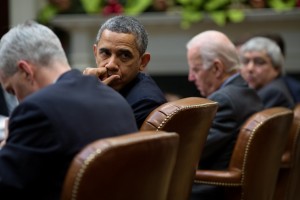
It has become conventional wisdom to say that President Barack Obama has suffered through a terrible year in 2013 -- and if his slumping poll numbers are the only gauge, then these pundits may have a point. But much of this analysis simply marches in lockstep with the neocon view of Obama's supposed foreign policy "failures," which may not be failures at all.
Indeed, there's a strong argument to be made that Obama's fifth year in office will be viewed as a historic turning point in U.S. relations with the Middle East, albeit one the neocons and much of Official Washington detest, thus explaining the hostility in their year-end critiques.
For instance, if the neocons and the many tough guys/gals inside the Beltway had their way in 2013, the U.S. military would have pummeled Syria in retaliation for its alleged (though still unproven) role in the Aug. 21 Sarin gas incident outside Damascus. We now know that the neocons' desired bombing campaign would have been coordinated with a ground offensive by the Saudi-Israeli-favored, Sunni-dominated jihadist rebels , possibly leading to "regime change" in Syria.
The U.S. assault also would likely have destroyed hopes of a nuclear agreement with Iran, thus raising the likelihood that Obama would have been goaded into a military attack on Iran's nuclear facilities. At each step of these escalations, the neocons would be egging Obama on, calling him "weak" and "indecisive" if he failed to ratchet up the pressure and violence.
Amid this mounting chaos, the neocons would have demonstrated that even when they are not sitting in the Oval Office, they could still direct U.S. foreign policy through their continued dominance of the op-ed pages of major newspapers, like the Washington Post, and via their strategic positioning at leading Washington think tanks.
Across Official Washington, there was a palpable sense of disappointment and even anger last summer when Obama abruptly halted the rush toward war with Syria, first seeking congressional support for a military strike and then accepting the help of Russian President Vladimir Putin in negotiating a graceful exit from the crisis by getting the Syrian government to surrender all its chemical weapons (though still denying a role in the Aug. 21 attack).
That was followed by Obama completing a historic deal with Iran, trading some sanctions relief for additional safeguards to ensure that Iran's nuclear program did not lead to a bomb. That tentative agreement disrupted what had been years of a carefully crafted neocon propaganda campaign to push the two sides into a military confrontation, as favored by Israeli Prime Minister Benjamin Netanyahu.
Obama's diplomatic offensive also has included pressing for meaningful Syrian peace talks in Geneva and pushing Iran to adopt a more constructive role in the region. All of this has infuriated the Saudi-Israeli alliance which favored escalating confrontations with the Syrian and Iranian governments. Back in the U.S., the neocons have never given up their dream of engineering multiple "regime changes."
The mainstream U.S. news media has mostly chalked up Obama's diplomacy with Syria and Iran as evidence of his "failures" -- part of the meme about his disastrous year -- but these moves could be seen as important achievements, indeed historic successes. Finally locating the keys to unlock the rigid hostility between Washington and Tehran is a diplomatic victory arguably on par with Richard Nixon's opening to China four decades ago.
If the neocons and the tough guys/gals don't disrupt this progress, history could look back on 2013 as a moment when a U.S. president finally stood up to well-entrenched interests favoring evermore warfare in the Middle East and found a new route around those endless battlefields.
What About Obamacare?
History also might clarify how Americans rate other developments in Obama's fifth year. The implementation of health-care reform, as rocky as it was, could mark another turning point -- in how the U.S. government addresses the needs of the people.
Republicans hope that their one-note campaign to repeal the Affordable Care Act will carry them to major election victories in 2014, and they may be right. But they also could confront voter skepticism over whether the GOP has any plan for improving the expensive, wasteful and indeed scandalous way that the U.S. health-care system has worked for generations.
The myriad problems confronting "Obamacare" also could have the effect of leading the nation toward more liberal reforms, such as a public option or a single-payer system as more efficient and more humane ways of structuring healthcare. Under the new law, states can experiment with single-payer approaches, as Vermont is doing, possibly setting a trend for the nation.
In 2013, Obama also forced the Republicans to back down on their strategy of taking the U.S. economy hostage -- through government shutdowns and with threats to default on the nation's debt -- and demanding major political concessions or else.
The failure of those GOP extortion tactics in October and the Senate's rule change in November to limit Republican filibusters of presidential nominees were serious setbacks for the Right's insistence that -- despite losing the 2012 elections -- it should be allowed to control U.S. government policies.
Developments outside Obama's control also might work eventually to his advantage. Clearly, during his first term, he was outgunned by the national security apparatus when it came to reining in key aspects of President George W. Bush's "war on terror."
(Note: You can view every article as one long page if you sign up as an Advocate Member, or higher).





